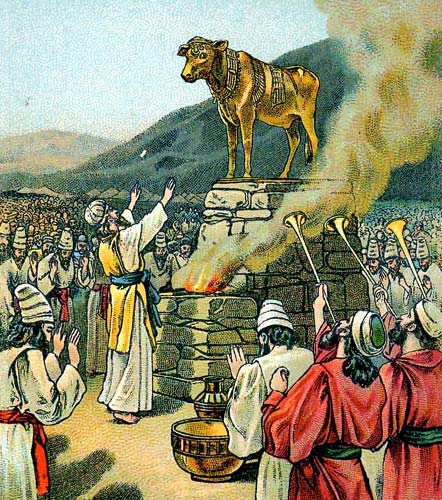 We know as Christians, on an intellectual level, that we have idols—be it family, food, football or whatever. But to see the allure of idolatry can be hard for those of us in the Western world.
We know as Christians, on an intellectual level, that we have idols—be it family, food, football or whatever. But to see the allure of idolatry can be hard for those of us in the Western world.
That’s why I appreciate the points laid out by Doug Stuart in his Exodus commentary (450-54). Stuart suggests nine reasons idolatry was attractive to the Israelites and in the cultures of the Ancient Near East.
1. It was guaranteed. If you do the right incantation, you get the right results. Just say the right words and the gods show up. Who wouldn’t want that?
2. It was selfish. In the ancient world, the gods, though they were powerful, needed humans to feed them. Sacrifices were brought to the gods because they were hungry. Consequently, you can get what you want from the gods simply be bringing them the sacrifices they need
3. It was easy. Sure, you need to show up and offer your sacrifice, but ancient religion demanded little in the way of ethical standards or personal sacrifice. To be a good Canaanite, you didn’t have to follow an elaborate moral code. You just had to put the meat on the altar. That was the mistake Israel fell into time after time. They thought they could live and worship anyway they wished, so long as they kept up with the religious rituals.
4. It was convenient. There were religious franchises all over the place. That’s why Israel got in trouble with their high places. They thought they could take care of their ritual duties just like everyone else. Israel was unique, however, in that there was only one place to go to—first to the tabernacle and later the temple.
5. It was normal. The only people who did not do religion like this in the ancient Near East were the Israelites. For everyone else, though they had gods with difference names and in different places, religion was done the same way.
6. It was logical. It made sense that there were lots of gods who specialized in one area of blessing or held sway over one part of the cosmos.
7. It was pleasing to the senses. There was an appeal to aesthetics and beauty. There was something to see and do in idolatrous worship. It was more entertaining and probably felt more relevant.
8. It was indulgent. Meat was a relative rarity in the ancient world. Not everyone had herds that they could sacrifice, so meat was often eaten only as a part of ritual worship. You would offer your meal, and in some cases you drink, to the god and then enjoy the feast yourself. As a result, worship took on a party atmosphere, filled with gluttony and drunkenness.
9. It was erotic. During ritual worship it was believed that if worshipers took the parts of Baal and Asherah (for example) and had sex, it would stimulate the deities in heaven to have sex. And when the gods and goddesses had sex, it meant procreation, which meant earthly blessings like fertility, rain, health, and good harvests. This is why prostitution became common at religious sites and why God rebuked Israel for adopting the same practice with both heterosexual and homosexual temple prostitutes.
The whole system of idolatry—guaranteed, selfish, easy, convenient, normal, logical, pleasing, indulgent, and erotic—when you look at it that way, the allure of idolatry does not seem far removed from us. It is easy to see how we can make idols out of everything from health insurance to retirement accounts to political candidates to academic approval to sports to entertainment to Facebook to food and sex.
What God was telling Israel was not easy for them, nor is it easy for us, but we must fight the good fight of faith and shun all idolatry. No matter common and no matter how attractive.

















